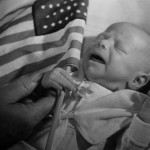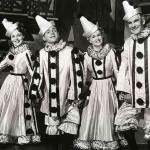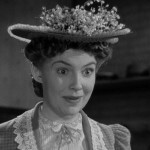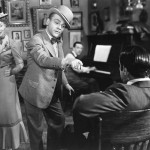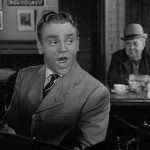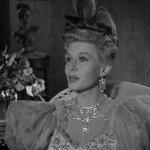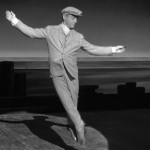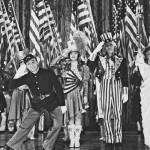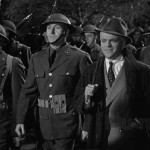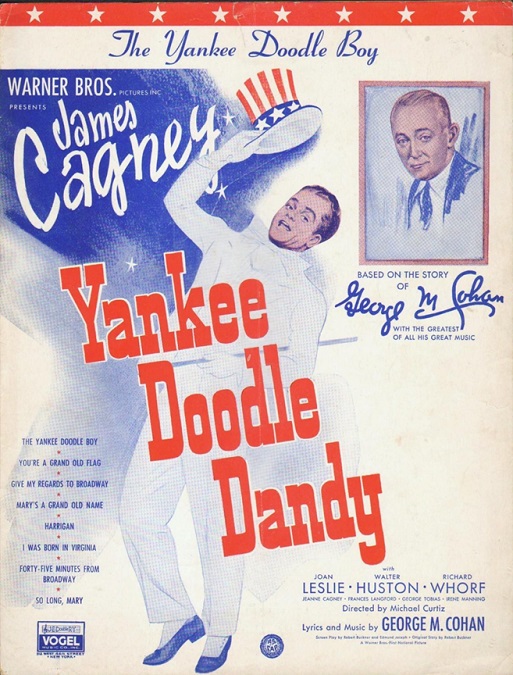
Yankee Doodle Dandy – 1942
This was another example of a shameless propaganda movie. As films go, it had its good points and its bad points, but was completely unapologetic about all of them. James Cagney played the leading role of George M. Cohan, about whom the film was made. It was a both a biography and a musical about the man who is often called the father of the American Musical Comedy.
Cohan started performing at a very young age as a singer and dancer on the stages of Vaudeville. He was clearly a talent to be reckoned with, often out-shining the other three members of The Four Cohans, his father Jerry, played by Walter Huston, his mother Nellie, played by Rosemary DeCamp, and his sister Josie, played by Cagney’s real-life sister, Jeanne Cagney.
It is also clear that he has an ego to match his talent. His boasting and bravado is so out of control that he ruins one opportunity after another for his family to move on to better stages. During his teen years, he meets, falls in love with, and nearly ruins the career of the beautiful Mary, played by Joan Leslie. Despite this, they marry, giving her the opportunity to bring his ego in check. That accomplished, his career takes off.
He partners up with playwright Sam Harris, played by Richard Whorf. Their collaborations are very successful and they both become very rich men. Eventually, The Four Cohans break up their act and George goes solo. He continues to write one hit song after another, many of them, like the song Yankee Doodle Dandy, having very patriotic themes. More fame and more money comes his way. WWI arrives and he writes patriotic anthems that inspire the nation.
In the end, his partnership with Harris dissolves amicably, both men ready to go their separate ways. George retires with his wife to live in the country, away from the public eye, that is, until Harris asks him for help by starring in his latest play. He accepts, and returns to the stage. And that’s the movie, in a nutshell.
But here’s the trick. The entire movie actually started with that performance, in which he played the current President, FDR. After the opening night’s curtain falls, he is mysteriously summoned to the White House by the “real” Roosevelt and asked to tell the story of his life. So the movie is really a flash-back. I didn’t mind that so much, except that the actor who played President Roosevelt got on my nerves. His lines were all delivered like the voice-over guy that you hear on all the action trailers of movies in the 1930s and 40s. His tone and inflection stood out to me as unnatural and distracting. Apparently, impressionist Art Gilmore provided that voice, which makes me wonder if FDR really sounded like that. If he did, I just want to hear the former President say, “Come see the greatest film of the year! Thrills, chills and spills!”
And while I’m on the subject of things that I didn’t like about the film, I have to mention Cagney himself. I’ll admit that this is the first movie I have ever seen starring James Cagney, and I have to say that I didn’t particularly care for his dancing style or his singing style. However, I learned that not only was it not his fault, he actually did a remarkable job.
Here’s why: Cagney’s dancing looked a bit ridiculous to my modern eyes. There was a bit of tap, which I didn’t mind, and a lot of moves done where he bent forward at the waist without bending his knees. It was a style that made him appear to move like a marionette puppet without strings. It made his dancing look stiff and jerky. His singing was also very minimal. He spoke his way through most of the songs in an annoying, high-pitched voice.
But in my research, I found that he was, in both ways, imitating the real George Cohan’s style. Apparently he imitated the famous vaudeville trained performer very well, so I have to give Cagney’s performance my approval, even though I didn’t care for the style itself. In fact, Cagney won the Academy Award for Best Actor that year.
Aside from that, I liked Richard Whorf and Jeanne Cagney. They stood out to me as good actors in their respective roles. I also liked a number of the songs, which were, for the most part, the songs that the real George Cohan was famous for writing: songs like Yankee Doodle Dandy, Over There, While Strolling Through the Park One Day, and You’re a Grand Old Flag. The film and the songs were designed to overflow with patriotism. Unfortunately, it sometimes felt a little forced, but I guess I can be forgiving. After all, the production on the film had barely begun when the Japanese attacked Pearl Harbor.
